
Takeaways from CNN's town hall with Nikki Haley
Former United Nations ambassador Nikki Haley made a forceful case for the United States' support for Ukraine, a stark contrast with the leaders of the Republican 2024 presidential field, in a CNN town hall Sunday night in Iowa.
2023-06-05 09:19
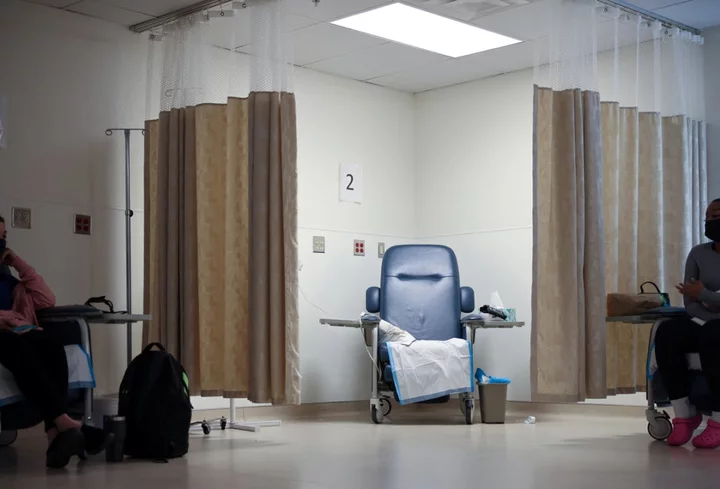
Oklahoma’s Supreme Court struck down two abortion bans. But a 113-year-old law is severely restricting access
Weeks before the US Supreme Court overturned Roe v Wade last year, Oklahoma’s Republican governor vowed to “outlaw” abortion in the state entirely, and pledged to sign any legislation that promised to do just that. Governor Kevin Stitt signed several anti-abortion bills into law, including a measure that outlaws abortion at roughly six weeks of pregnancy, and another banning all abortions with exceptions only to save the patient’s life in a medical emergency or if the pregnancy is the result of rape, sexual assault or incest that has been reported to law enforcement. On 31 May, the highest court in the state struck down both of them. But abortion access remains out of reach for most patients in the state, after that same court upheld a far-reaching abortion ban from more than 100 years ago earlier this year. A state law from 1910 makes it a felony punishable up to five years in prison for anyone to perform or help someone seek an abortion unless to save the patient’s life. “This ruling, while providing clarity in emergency situations, does not change the landscape of care significantly,” Emily Wales, president and CEO of Planned Parenthood Great Plains, said in a statement. Oklahoma was the first state in the US to successfully outlaw abortion despite a constitutional right to abortion care that was affirmed by Roe v Wade. But in March, the state’s Supreme Court ruled that the state’s constitution “creates an inherent right of a pregnant woman to terminate a pregnancy when necessary to preserve her life,” though the court declined to weigh in on whether the constitution protects abortion access in other circumstances. The court also ruled that doctors should be able to use their own medical judgment to determine whether to provide an abortion when a patient’s life is at risk “due to the pregnancy itself or due to a medical condition that the woman is either currently suffering from or likely to suffer from during the pregnancy.” But it also preserved the 1910 law, a 113-year-old ban on abortion care that threatens providers with prison. The court’s decision on 31 May reaffirmed its decision recognising a right to abortion care in life-threatening cases, and struck down two the overlapping bans. In the months after the Supreme Court’s decision in Dobbs v Jackson Women’s Health Organization, which struck down a constitutional right to abortion care, clinics in Oklahoma have been forced to close, and patients have traveled thousands of miles for legal abortion care in a region surrounded by states where abortion is severely restricted or effectively outlawed. Even in cases of emergencies, there appears to be no hospital in Oklahoma that provides “clear, consistent policies for emergency obstetric care to pregnant patients,” according to an April report from Physicians for Human Rights, Oklahoma Call for Reproductive Justice and the Center for Reproductive Rights. Oklahoma hospitals “offered opaque, contradictory, and incorrect information about abortion availability and approval processes in obstetric emergencies, as well as little reassurance that clinicians’ medical judgment and pregnant patients’ needs would be prioritized,” according to the report. Only two out of 24 hospitals described providing legal support for providers in such situations, and representatives for three hospitals claimed their facilities do not provide abortions at all, the report found. Abortion rights advocates welcomed the court’s decision on 31 May, which abortion rights advocates said will at least allow doctors to clearly rely on their own medical judgment to provide care when a patient’s life is in jeopardy. “After months of uncertainty and chaos, Oklahomans should finally be able to access the life-saving care they need in their home state,” according to Dr Alan Braid, an abortion provider and plaintiff in the case challenging the overlapping abortion bans. “Heartbreakingly, we were forced to close our Tulsa clinic due to Oklahoma’s abortion bans, but I will continue to serve patients in the region at clinics in Illinois and New Mexico,” he added. “While we are relieved the court upheld the right to abortion in medical emergencies, this does not diminish the fact that care remains out of reach for the majority of Oklahomans,” according to Ms Wales. Following the state Supreme Court decision on 31 May, Oklahoma Attorney General Gentner Drummond clarified that “except for certain circumstances outlined in that statute, abortion is still unlawful in the state of Oklahoma” because of the 1910 law. Governor Stitt accused the court of using “activism to create a right to an abortion in Oklahoma.” “This court has once more over-involved itself in the state’s democratic process, and has interceded to undo legislation created by the will of the people,” he said in a statement. Within the last year, more than a dozen states – including most of the entire US South – have outlawed abortion care for most pregnancies. Read More ACLU sues Nebraska over combined law targeting abortion and gender-affirming care: ‘Egregious overreach’ South Carolina judge halts six-week abortion ban as state Supreme Court set to review new law Doctor who provided abortion care to 10-year-old rape survivor reprimanded in case that drew national scrutiny Anti-abortion laws harm patients facing dangerous and life-threatening complications, report finds
2023-06-01 07:15
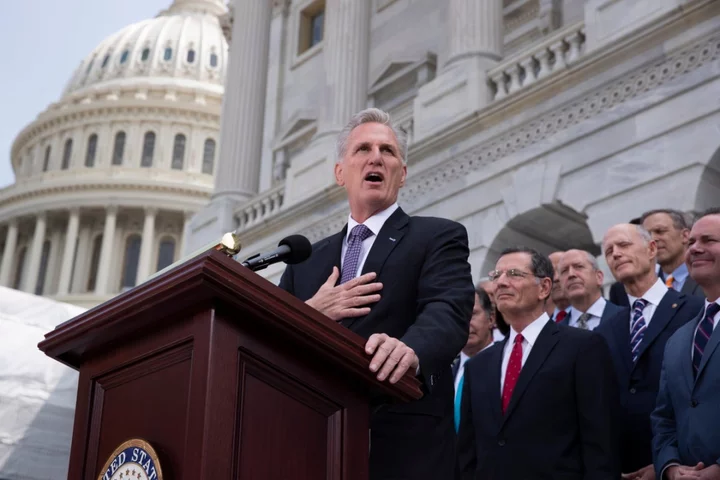
Anti-poverty groups and progressives blast work requirements for aid to poor Americans in debt ceiling deal
An agreement to raise the debt ceiling would expand the age bracket for eligibility for food assistance, adding a punitive and unnecessary barrier for poor Americans with only negligible savings for the federal government, advocacy groups have warned. Most Americans with low or no incomes who qualify for the Supplemental Nutrition Assistance Program (SNAP) must comply with certain work requirements to be eligible to receive funds to help pay for groceries. But under a deal struck between President Joe Biden and Republican House Speaker Kevin McCarthy, adults up to age 54 would be required to show proof of work. Republican lawmakers have pushed for years to expand those work requirements, but anti-poverty advocacy groups and progressives have argued that adding any such limitations to critical aid will only deepen hunger and poverty in the US, pointing to Congress’ own research showing that work requirements don’t appear to have any measurable effect on employment. “SNAP is a symptom of shortcomings in the economy,” Luis Guardia, president of the Food Research & Action Center, said in a statement. “Cutting off food for people unless they document sufficient hours of work does not improve their chances to secure family-sustaining wages, but does increase their food hardship.” In simple terms, a congressional vote to raise the debt ceiling would allow the US Department of Treasury to continue borrowing money to pay the country’s bills. But Republican lawmakers have leveraged the often routine though critical vote process to advance their agenda, as the nation stares down an imminent deadline that risks putting the US in default. “While we all recognize the catastrophic impact of a default, we are deeply disappointed that this deal includes cuts that further harm people experiencing hunger and poverty,” said Lisa Davis, senior vice president of Share Our Strength and its No Kid Hungry campaign. “As a whole, the punitive and ineffective SNAP changes included in this bill will save the US very little money,” she added. “They will also do nothing to remove barriers to make employment more attainable or available for those they impact. Nor are they based on evidence or experience. Instead, they are born from and rely on pervasive myths and misperceptions about SNAP and the people who benefit from the program and stand only to restrict food assistance for some Americans.” Republicans hold a fragile majority in the House of Representatives, where Mr McCarthy is relying on a slim margin of support from a far-right caucus that argues the cuts don’t go far enough. Meanwhile, progressive lawmakers – frustrated with the GOP’s “hostage crisis” process for negotiating a debt deal – strenuously object to stiffening work requirements and cuts to aid programs on which millions of Americans rely. Democratic US Rep Pramila Jayapal, who chairs the Congressional Progressive Caucus, will not support the debt plan, pointing to members who are “deeply, deeply concerned” about the proposals and the way in which Republicans threatened to steer the US into default to get GOP concessions. On a call with reporters on 30 May, Ms Jayapal compared Republicans’ threats on the debt limit to the party’s attempts to undermine the outcome of the 2020 presidential election. “We cannot have these constitutional obligations, including the very clear mandate to pay the country’s debts, as well as of course to ratify an election of a president that was voted upon by the democratic process ... taken hostage,” she said. The Biden administration has touted some new proposals in the deal as a victory: Military veterans, young people who have aged out of foster care, and people experiencing homelessness would be exempt from the SNAP work requirements. But “burdensome reporting requirements and bureaucratic red tape leave little confidence that this will outweigh the harmful expansion of these requirements for others in this category,” Ms Davis said in a statement. The nation’s largest food assistance program supported more than 42 million people in February, according to the latest data from the US Department of Agriculture. More than 65 per cent of SNAP recipients are in families with children, 36 per cent are in families with members who are older or disabled adults, and 41 per cent are in families that work, according to the Center on Budget and Policy Priorities. SNAP requires “able-bodied adults” without dependents to work or join job training programs for at least 80 hours a month to receive more than three months of benefits over three years. “SNAP’s primary objective is to help people put food on the table; any attempt to turn it into an employment program – particularly when extensive research shows that work requirements actually make it much harder, not easier, for people to find and keep jobs – runs contrary to the program’s mission and intent,” said Eric Mitchell, executive director of the Alliance to End Hunger. “In a time when food insecurity is rising and food prices remain high, we should be expanding our nation’s social safety net, not restricting it,” he added. The maximum monthly SNAP benefit for an individual is $281, “which makes the 80-hour work program route effectively the same as a job that pays $3.51 per hour,” or less than half the federal minimum hourly wage of $7.25, People Policy Project’s Matt Bruenig noted. Progressive lawmakers and advocacy groups have also lambasted the debt deal for tying the fate of federal programmes for some of the poorest Americans to a politically volatile debate. What happens for someone over 50 years old who is unable to work and is cut off from assistance? How can they navigate a difficult labour market rife with age discrimination? Anti-poverty advocates and critics of so-called “means-testing” structures around receiving government aid have argued that adding additional burdens for work requirements underscores their futility. “We shouldn’t be playing politics with programs that help Americans meet their basic needs,” Ms Davis said. Anti-hunger groups have also objected to other changes to other assistance programs for lower-income-earning Americans, including changes to a federal cash assistance program that House Republicans had previously threatened with drastic cuts. “Hungry people cannot wait – but now they will need to wait even longer,” Mr Garcia said. “Our leaders should be creating pathways to progress, not pulling out the rug from those trying to get back on their feet.” Read More Debt ceiling vote – live: AOC, Boebert and Gaetz join growing opposition as Biden-McCarthy deal faces full House vote today What’s in the cliffhanger deal struck by Biden and McCarthy to raise the debt limit? House Republican majority cut by one after shock resignation of congressman
2023-06-01 00:48
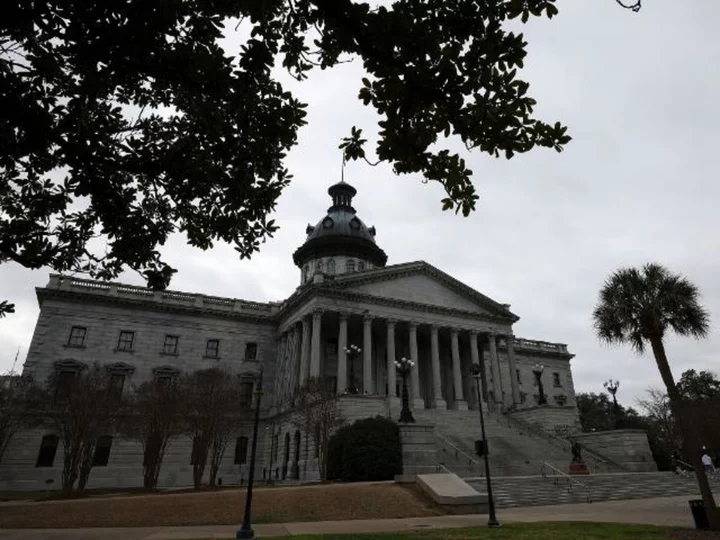
State judge temporarily blocks South Carolina's 6-week abortion ban
A South Carolina judge has temporarily blocked the state's new abortion restrictions from going into effect, just one day after the governor signed them into law.
2023-05-27 00:59
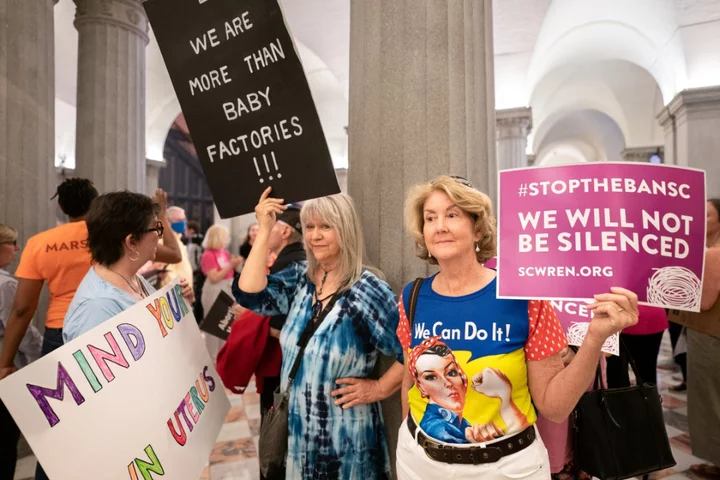
South Carolina judge halts six-week abortion ban as state Supreme Court set to review new law
The day after the state’s Republican governor signed the ban into law, a judge in South Carolina has blocked a measure outlawing abortion at roughly six weeks of pregnancy. Abortion rights advocates and civil rights groups filed a lawsuit moments after Governor Henry McMaster announced his signature on the bill. South Carolina’s latest law – which could extend the sweeping restrictions and outright bans on abortion care across the entire US South, and threaten legal access to care for millions of Americans – is nearly identical to a bill that was blocked by the state Supreme Court last year. The decision on Friday means the state’s abortion regulations revert to previous rules that allow for abortion care up until about 20 weeks after after fertilization. “The status quo should be maintained until the Supreme Court reviews its decision,” Judge Clifton Newman said. “It’s going to end up there.” His decision on 26 May comes just four months after the state’s Supreme Court permanently struck down a similar measure, which the court determined ran afoul of the state’s constitution. Restrictions on abortion care “must be reasonable and it must be meaningful in that the time frames imposed must afford a woman sufficient time to determine she is pregnant and to take reasonable steps to terminate that pregnancy,” Justice Kaye Hearn wrote in the majority opinion on 5 January. More than a dozen states, mostly in the South, have outlawed most abortions or severely restricted access within the year after the Supreme Court’s ruling in Dobbs v Jackson Women’s Health Organization, which revoked a constitutional right to abortion care that was affirmed by the decision in Roe v Wade for nearly half a century. South Carolina remains the only state south of Virginia without severe restrictions or outright bans on abortion care past the 12th week of pregnancy. Most of those states have moved to ban abortion in nearly all cases with limited or no exceptions. Last year, lawmakers in South Carolina failed to adopt an anti-abortion law that would ban nearly all abortions in the state, but a six-week ban took effect shortly after the Supreme Court’s ruling on 24 June. In a statement following the governor’s signature on the latest six-week ban, White House press secretary Karine Jean-Pierre lambasted Republican lawmakers who are “dismantling women’s rights across the South, putting their health and lives in jeopardy. “ South Carolina’s ban will cut off access to abortion for women in the state and those across the entire region for whom South Carolina is their closest option for care,” she added. This is a developing story Read More North Carolina Republicans approve 12-week abortion ban as sweeping restrictions spread across US South Senator who voted for anti-trans bill that passed by one vote admits she wasn’t paying attention From the Civil War to today's mattress sales, Memorial Day is full of contradiction GOP leaders in Kansas back off threat to sue Democratic governor over education funding DeSantis pushes past embarrassing campaign start, outlines travel schedule for early state visits
2023-05-27 00:20
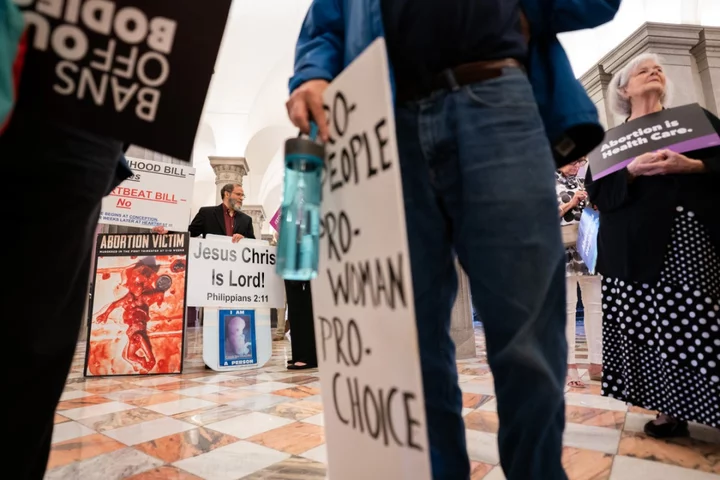
South Carolina enacts six-week abortion ban, threatening access across entire South
The state of South Carolina has outlawed abortion at roughly six weeks of pregnancy, extending the sweeping restrictions and outright bans on abortion care across the entire US South, and threatening legal access to care for millions of Americans. Republican Governor Henry McMaster signed legislation into law on 25 May after the bill’s final passage earlier this week. It goes into effect immediately. Republican lawmakers in neighbouring North Carolina recently voted to override the Democratic governor’s veto of a bill outlawing abortion at 12 weeks of pregnancy, restricting abortion access in a state that has been a haven for abortion care in the year after the US Supreme Court’s decision to reverse Roe v Wade. More than a dozen states, mostly in the South, have outlawed most abortions or severely restricted access within the year after the Supreme Court’s ruling in Dobbs v Jackson Women’s Health Organization, which revoked a constitutional right to abortion care that was affirmed for nearly half a century. Abortion rights restrictions in North Carolina and a six-week ban in South Carolina dramatically change the map for abortion access in the US, where abortions are banned in most cases from Texas to West Virginia and along the Gulf Coast, making legal access to care out of reach altogether across the Deep South. Abortion rights advocates and civil rights groups have filed a lawsuit to challenge South Carolina’s law in court. The lawsuit comes just four months after the state’s Supreme Court permanently struck down a nearly identical law, which the court determined ran afoul of the state’s constitution. Restrictions on abortion care “must be reasonable and it must be meaningful in that the time frames imposed must afford a woman sufficient time to determine she is pregnant and to take reasonable steps to terminate that pregnancy,” Justice Kaye Hearn wrote in the majority opinion on 5 January. “Six weeks is, quite simply, not a reasonable period of time for these two things to occur,” the judge added. Jenny Black, president and CEO of Planned Parenthood South Atlantic, said in a statement that South Carolina lawmakers “have once again trampled on our right to make private health care decisions, ignoring warnings from health care providers and precedent set by the state’s highest court just a few months ago.” “The decision of if, when, and how to have a child is deeply personal, and politicians making that decision for anyone else is government overreach of the highest order,” she added. “We will always fight for our patients’ ability to make their own decisions about their bodies and access the health care they need. We urge the court to take swift action to block this dangerous ban on abortion.” Governor McMcaster has pledged to defend the law in court. “We stand ready to defend this legislation against any challenges and are confident we will succeed,” he said in a statement. “The right to life must be preserved, and we will do everything we can to protect it.” Read More Mother forced to give birth to stillborn son joins lawsuit against Texas abortion ban Senator who voted for anti-trans bill that passed by one vote admits she wasn’t paying attention Twitter's launch of DeSantis' presidential bid underscores platform's rightward shift under Musk Timeline: How Georgia and South Carolina nuclear reactors ran so far off course Georgia nuclear rebirth arrives 7 years late, $17B over cost
2023-05-26 00:29
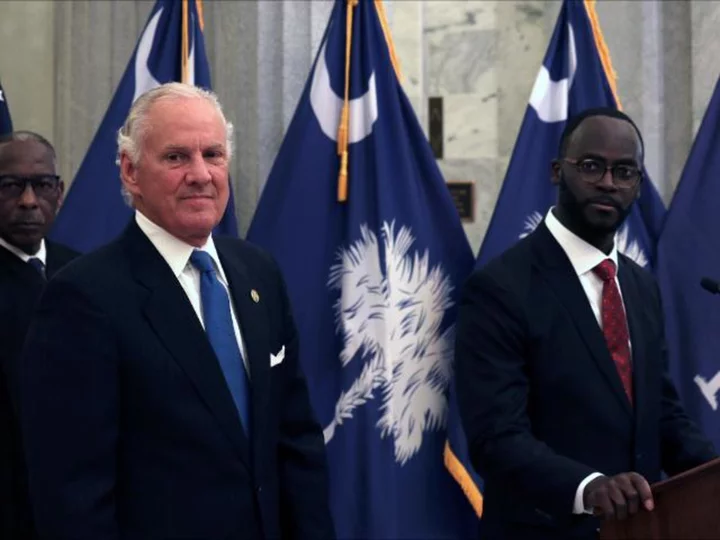
South Carolina governor signs 6-week abortion bill into law
South Carolina Gov. Henry McMaster on Thursday signed a bill into law that will limit most abortions as early as six weeks into a pregnancy.
2023-05-25 23:51
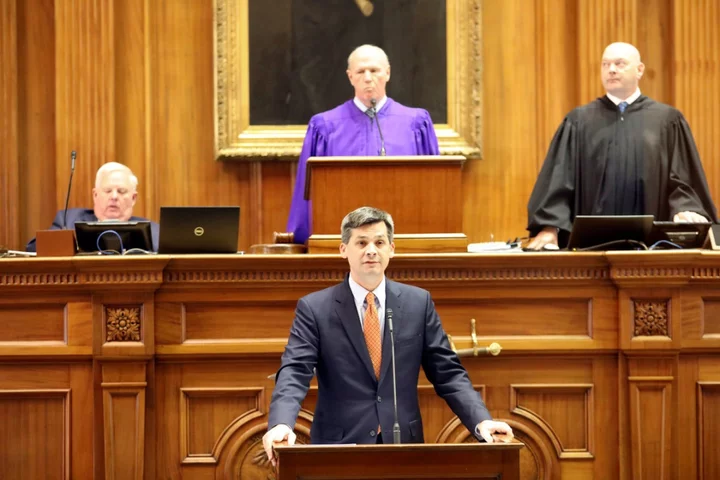
South Carolina passes six-week abortion ban over objections from all women senators
The South Carolina Senate on Tuesday passed a six-week abortion ban despite the fact that every woman senator in the chamber, Republican and Democrat, voted against it. The abortion ban will now go to the desk of Gov Henry McMaster, a Republican. If Mr McMaster does sign the bill as expected, it will be another blow to people seeking abortion care in the southeast. Nearly every other state in the region has enacted abortion bans since the fall of Roe v Wade last year. If Mr McMaster signs the ban into law, it is likely to face a legal challenge. The South Carolina Supreme Court earlier this struck down a previous version of a six-week abortion ban as unconstitutional. But that didn’t stop Republican men in the state legislature and the male Republican governor from pushing to pass a ban anyway. Six-week bans on abortion are considered near total bans because many people don’t know they’re pregnant until more than six weeks after conception. This story will be updated. Read More Haley vs. Scott: From South Carolina allies to 2024 rivals South Carolina Republicans hear pitches from 2024 candidates, reelect state party chairman Republican abortion debate inches toward resolution in South Carolina
2023-05-24 08:20
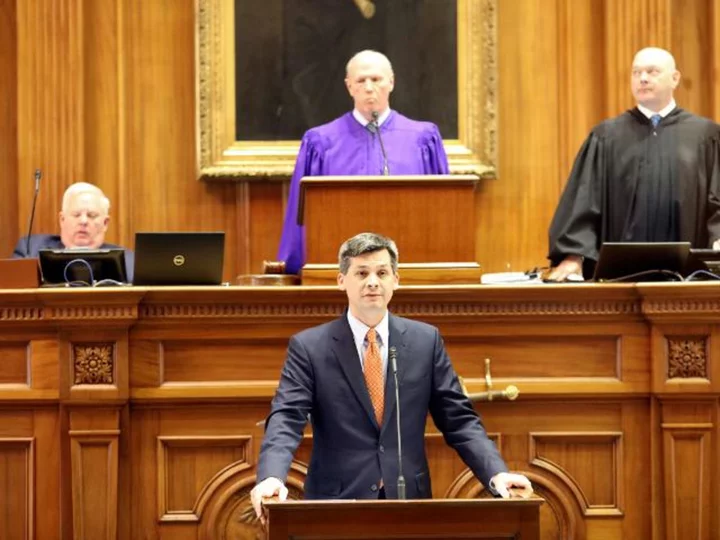
South Carolina legislature sends 6-week abortion ban to governor's desk
A controversial six-week abortion ban bill is headed to South Carolina Gov. Henry McMaster's desk to be signed into law after the measure cleared the state Senate Tuesday.
2023-05-24 07:51
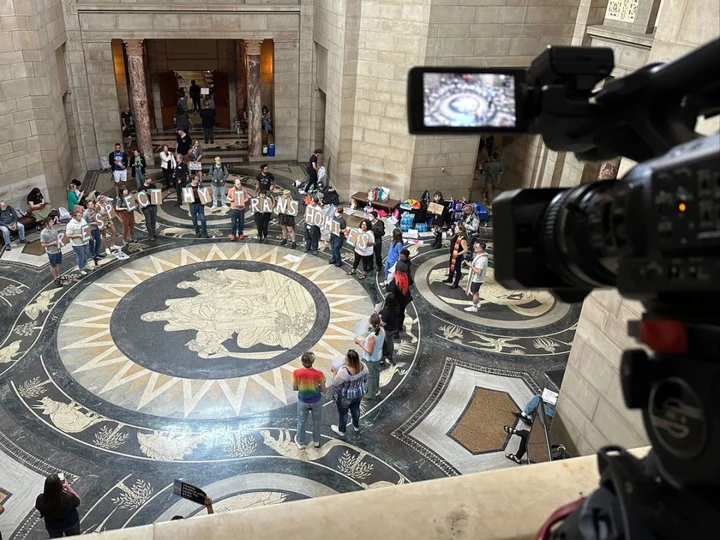
Nebraska lawmakers block photos of ‘clearly ill’ senator brought from hospital to ensure votes to ban abortion
Republican state legislators in Nebraska rammed through a contentious bill restricting abortion and transgender healthcare last week with the help of a sick colleague who had just gotten out of hospital. Julie Slama, a state GOP senator, confirmed on Friday that she had been receiving treatment for hyperemesis gravidarium, a serious complication of pregnancy, but made it to the statehouse in time to cast a decisive vote. Earlier that day, Nebraska Examiner reporter Paul Hammel had posted a picture of her looking “clearly ill” as colleagues from both sides of the debate stood around her to shield her from TV cameras. According to Hammel, Ms Slama cast the crucial 33rd vote that allowed the bill to overcome a months-long filibuster by progressive senators that had brought Nebraska’s unicameral legislature practically to a standstill. The bill, signed into law by governor Jim Pillen on Monday, bans abortion after 12 weeks of pregnancy, starting immediately, and all gender transition healthcare for trans people under the age of 19, starting in October. “I was hospitalised today with hyperemesis gravidarum,” Ms Slama tweeted on Friday evening. “Made it back in time to vote, and on the most divisive bill of the entire session. “Everyone put their differences aside and joined in a wall to keep my illness from the cameras. ‘Gratitude’ doesn’t even begin to cover it,” she said. In another tweet on Saturday morning, she said: “Do I like that [the photo] is out there? No. But sometimes in government, private battles end up public. I shared to address questions about my health, but also to give my colleagues credit for their kindness, especially Machaela Cavanaugh.” That last name was notable because Ms Cavanaugh, along with her progressive colleague Megan Hunt, has been one of the public faces of the 12-week filibuster that had blocked almost all legislation in this session so far. Ms Cavanaugh has described the trans healthcare ban as a stepping stone to “genocide”, telling The Independent earlier this month that it was aimed at “exterminating ‘transgender’ from existence”. Nevertheless, she was among the senators who stood in front of Ms Slama to block her from view, and later tweeted at Hammel to “delete this please”. Another Republican senator, Lou Ann Linehan, had complained that she had to miss her grandson’s preschool graduation ceremony because of the filibuster and the prolonged debate it created. Ms Hunt, who has a trans child, shot back: “If you want to see your grandson graduate from preschool, you should do that. Instead, you are here to drag out this session because you won’t come off this bill that hurts my son. You hate him more than you love your own family.” Hammel defended his decision to tweet the photo, saying: “No more public place than floor of [the] Nebraska legislature.”
2023-05-23 12:27

Nebraska GOP senator who voted for anti-trans and anti-abortion bill that passed by one vote admits she didn’t pay attention to the issue
A Nebraska Republican state senator who voted for a combined anti-trans and anti-abortion bill that passed by one vote in the legislature has admitted that she didn’t pay attention to the issue. State Senator Christy Armendariz represents the 18th District in the state. Writing for New York magazine, journalist Lila Shapiro said that the senator “led me to a bench in an empty hallway” to say that she “found it puzzling that a reporter from New York would come all the way to Nebraska to cover this affair”. “I don’t watch the news or get the newspaper,” she told the magazine. “Is there anything going on I should be aware of?” The writer told Ms Armendariz that other states have passed other similar bills restricting trans and women’s reproductive rights and that an appeals court on the federal level in the Nebraska circuit had ruled that one of them was unconstitutional. “So is it a big widespread thing?” she asked the writer, adding that regular Nebraska residents were unaware of the issue. “I knocked doors for a year, and nobody brought this up,” the senator said, adding that she wished that the legislation had never been brought to the floor. For three months, a group of lawmakers in the state has ground nearly all legislative business in the state to a halt, grabbing the nation’s attention with a remarkable filibuster to stifle a bill that would end gender-affirming care for young transgender people. Late Tuesday 16 May, Republican lawmakers broke through, advancing a bill that not only bans gender-affirming care for trans people under 19 years old but also tacks on an amendment to outlaw abortion after 10 weeks of pregnancy and hands the state’s GOP-appointed medical officer the authority to set the rules for affirming care for trans youth. Hundreds of protesters filled the capital in Lincoln, standing outside the doors and in the gallery above lawmakers while chanting “one more vote to save our lives”; only one senator would have had to defect from supporters of the bill to kill the legislation. The vote – on the 78th day of a 90-day session – followed a series of manoeuvres that opponents argued were bending and breaking the rules of the state legislature to hammer through the legislation and avert the filibuster, which would allow opponents to occupy their allotted time to speak the bill to death. “What you are attempting to do today is the lowest of the absolute lows,” state Senator Machaela Cavanaugh, who spearheaded the filibuster, told Republican lawmakers. “You literally have to cheat at every moment of this debate in every possible way … You are allowing it to happen,” she added. “You do literally have blood on your hands, and if you vote for it, you will have buckets.” State Senator Megan Hunt, the first openly LGBT+ member of the state legislature and the mother of a trans child, lambasted lawmakers for their “escape routes” from the capitol to avoid facing protesters. “If you can’t go out and face them, you are not worthy,” she said. “Your legacy is filth.” Protesters surrounded the state capitol chambers in Lincoln on 19 May chanting “keep your bans off our bodies” and “save our lives” as lawmakers made their final round of votes on the bill, which passed 33-15, according to Reuters. The bill reached the exact number of votes needed to pass. Republican Governor Jim Pillen signed it into law on Monday. Before signing the bill, Mr Pillen said, “We are working to inspire Nebraskans to get in the game so that abortion is simply unthinkable in the state of Nebraska,” according to WOWT. He added that it was “an extremely historic day for Nebraska. It’s a day where it’s really simple: We’re standing up to protect our kids so our state has a bigger and brighter future. LB574 is the most significant win for [the] social conservative agenda that over a generation has seen in Nebraska. I think that’s something we need to clap and shout about”. At a show in Nebraska hours after the vote on Friday night, the artist Lizzo lambasted the legislation from the stage. “It really breaks my heart that there are young people growing up in a world that doesn’t protect them,” she said. “Don’t let anyone tell you who you are. ... These laws are not real. You are what’s real, and you deserve to be protected.” Ari Kohen, a political science professor at the University of Nebraska–Lincoln, tweeted: “Hat tip to Senator Armendariz, who says she doesn’t know anything about the issue, doesn’t pay attention to current events, and wishes the bill she voted for hadn’t been introduced. It passed by 1 vote.” “These are the people who devoted an entire legislative session to taking away people’s rights in the face of massive opposition from experts and ordinary citizens. They openly admit that none of their constituents mentioned this issue to them and they don’t know much about it,” he added. “We have a handful of legislators who care enough to listen and learn. And then we have the majority, who seem not to know or care what they’re doing as long as it feels right to them and they have the votes to do it. Awful.” Journalist and author Charles Jaco tweeted that a similar assessment could be made regarding the Missouri legislature. “You have a handful of lawmakers who are serious, substantial people. The rest are various shades of know-nothing religious fanatics, grifters, and bigoted buffoons,” he tweeted. The Independent has reached out to Ms Armendariz for comment. Read More Nebraska governor to sign 12-week abortion ban, limits on gender-affirming care for minors Lizzo blasts Nebraska bill banning abortion access and gender-affirming care: ‘You deserve to be protected’ Here are the restrictions on transgender people that are moving forward in US states Nebraska governor to sign 12-week abortion ban, limits on gender-affirming care for minors Lizzo blasts Nebraska bill banning abortion access and gender-affirming care Nebraska expected to pass 12-week abortion ban, restrictions on gender-affirming care
2023-05-23 03:15

Supreme Court ducks fight over foie gras, leaving California ban in place
Canadian duck and goose farmers call the controversial delicacy the most "maligned and misunderstood food in the world."
2023-05-22 23:27
